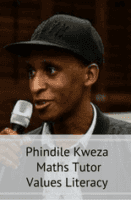Mathematics is a fundamental discipline for a child’s mental nourishment and growth. It is important to recognise why mathematics matters and why it is important to produce young people who are good at it. It has been recognised that much of why African children were not doing well in maths was because there was a big language gap which made learning and understanding it relatively difficult. Meet 32 year old Phindile Kweza from Bongweni, Khayelitsha, a mathematics enthusiast and tutor whose hopes have been to bridge that gap by starting at the grassroots of literacy with his pupils.
“Mathematics has always been my passion, since high school I have been driven to help others succeed in it,” says enthusiastic Phindile. It was after years of studying and working in mathematics-related fields that Phindile recognised an urgent need in the younger population who had a difficult time succeeding in it because they didn’t understand it properly.
Phindile says this is why much of the African population is relatively uninterested in mathematics. “It’s not that children are not intelligent or bright when it comes to maths, it’s really just not easy for them to grasp mathematical concepts because of a huge English barrier,” he says.
This recognition is what drove him to do what was within his capability to try to bridge the apparent language gap among African young people. In 2011 he was introduced to FunDza and later became one of FunDza’s many beneficiaries who received free books.
“I would use the books during my maths tutoring classes on Saturdays and during break times with getting the children to read in turns and having English discussions with them afterwards,” says Phindile. He believes that such practices have a chance of helping them understand mathematics, “because they will have been able to grasp English after much practice. And ‘practice makes perfect.’”
“Mathematics is easy as long as you understand it; it becomes a language just like other languages.”
With English being the prime language of instruction in a multi-lingual South Africa, Phindile says it is still fairly hard to find good mathematics teachers who speak local languages, and therefore it is the duty of those who exist to boost the enthusiasm of African learners in mathematics.
“I would conduct my lessons on Saturdays and during breaks, it was something I would do alone… Due to a job change in 2015, I had to take a little more time off and it has now become an occasional thing, where I check up on those learners from time to time, to see how much they’ve progressed and possibly give them motivation to keep them reading,” he explains.
Today Phindile works for a maths tutoring agency called, ‘Numerics’, where he runs afternoon maths classes at schools with primary school kids.
“Maths has always been my calling, and I believe it is my moral objective to spread love and understanding for it,” he says. He believes that sparking a love for mathematics at a young age is the best approach because it is difficult to change the mind of someone who has already made their mind up about something. According to him, beginning at primary will also afford children an easier transition to more challenging high school mathematics.
He acknowledges that mathematics is a critical skill for all, especially in today’s rapidly evolving technology.
He says, “The need for mathematics is dramatically increasing and the world is increasingly in need of more mathematically savvy young people who can complement such advancements, both practically and academically.”
“Mathematics is not only important as a school subject, but is also a great skill which opens doors for other much needed undergraduate disciplines,’’ he says.
Even beyond academia, Phindile says it an important skill for all adults in general. As he says, “It has been proven that a mathematically well-educated population contributes to the country’s economic prosperity.”
His message to young people is that despite hardships, pain and misfortune, each young person has a capacity to be great.
“I know from experience that one’s circumstances are not a necessary determinant of your fate, young people must believe in themselves more than they believe in the people who stand before them, that is how they will grow,” says an inspirational Phindile.
“If you know your passion, it doesn’t have to be maths, follow it with all that’s in you, don’t listen to people who put you down, your life depends on you. It is important knowing what it is you want and who it is you associate with, because negative people will try to bring you down.”





